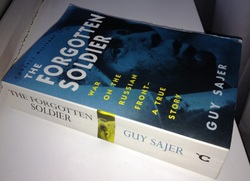 The Forgotten Soldier - Guy Sajer
The Forgotten Soldier - Guy Sajer The autobiography is Sajer’s efforts at conveying the sheer horror of war and its psychological impact upon him. The account is not a factual, historical account of the Wehrmacht’s Russian campaign but rather a recording of the emotional and physical destruction wrought upon him by constant fear, constant danger, continual loss of life, hunger, sickness, appalling winter weather and the complete loss of hope.
Sajer conveys his journey from an innocent 17 year old to a burnt out, emotionally scarred, wreck at 20 - whose mother didn’t even recognise him when he got home. Sajer’s bitterness is apparent throughout and the book is not easy or comfortable reading - in fact much of it is frankly depressing, but it is poignant and fascinating nonetheless.
The author makes no attempt to portray himself as a brave, heroic character or even to suggest his suffering was any different to his colleagues (in fact his belief in his pals was greater than his belief in himself).
Sajer’s survival is an incredible story of triumph over adversity, but it is not a celebration. If you ever bemoan your lot, this account will make you realise just how lucky you are.
His honesty made me wonder how on earth I’d cope with even a fraction of his challenges. It also made me extremely grateful that I have never had to have the same experiences.
More than twenty years ago now, I used to have a girlfriend whose grandfather fought in the British Navy in WW2. He was a bit like Grandad, or Uncle Albert form “Only Fools and Horses” in the sense that almost every tale he had to tell was based around an experience in the war.
I always listened, took an interest and asked questions, but at the back of my mind was the observation that his life in the years since the war must have lacked something – he’d got married, had kids, they in turn provided grandchildren, he worked until he retired and yet his life still revolved around 5/6 years of his 70-80 year life span. Being honest, I used to feel a little sad for him because by contrast, I was always looking forward to the next experience rather than reflecting on old ones.
Reading “The Forgotten Soldier” though helped me understand how soldiers, sailors, airmen could become so affected. After such terrible wartime experiences, day-to-day, normal life must have seemed vacuous, mundane, lethargic and pointless. Sajer undoubtedly wrote about his experiences to help him recover, Sue’s grandad was happy to talk.
Having finished the book, I’d like to know how Sajer has lived his life since the end of the Second World War. I understand that he is still alive and that puts him in his late eighties; it is quite fitting that he should live for so long after facing so much hardship – during the war he thought every day would be his last and yet 68 years later he’s still alive.
Finally, this is a word-of-mouth book – my dad was lent it by a friend, he then passed it to me, I am now recommending it to you. Next time you think about reading an autobiography, don’t pick up some trashy outpouring from some starlet or short-term celebrity, read “The Forgotten Soldier” instead – it’s deep and meaningful and well worth the investment of your time.
Blog Home
Blog Library
Home
 RSS Feed
RSS Feed
